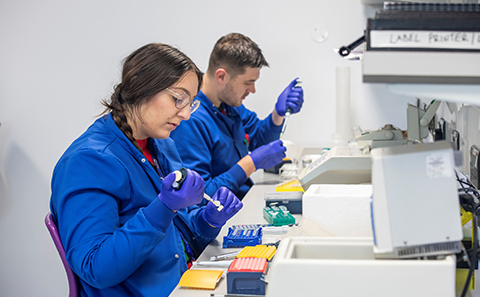Southampton studies change the way Chronic Lymphocytic Leukaemia is treated

Research from the School of Cancer Sciences is changing the way Chronic Lymphocytic Leukaemia (CLL) is treated.
In two new research papers, the team led by Professor Francesco Forconi, explored the use of venetoclax, in hard-to-treat patients and in combination with other therapies.
Venetoclax is a type of targeted cancer drug called a cancer growth blocker. It blocks certain proteins in cancer cells (BCL2 proteins) that help them grow and survive. By blocking BCL2, it is able to kill and slow down the growth of cancer cells. B-cell receptor-associated kinase inhibitors (BCRi) are a class of drugs that target specific enzymes involved in cancer growth. BCRis have been shown to treat cancer but they can be toxic if taken over a long time, which they usually are.

Both studies demonstrate the potential for using venetoclax to treat patients with CLL and as such, NICE has now approved use of venetoclax in combination with the BCRi ibrutinib so that CLL can eventually become undetectable after a finite period time.
Professor Forconi’s team has implemented a new service for minimal-residual disease assessment within his clinic at Southampton General Hospital to utilise venetoclax-based combinations in more patients and stop the treatments as soon as they become no more necessary.
A standalone treatment option
The efficacy and safety of Venetoclax in combination with other therapies has been established in relapsed or refractory and previously untreated CLL patients but long-term data on Venetoclax as a single treatment in relapsed or refractory CLL, including BCRi relapsed or refractory CLL, is lacking. This is what the Southampton team set out to assess.
In a study published in Lancet Oncology, 258 CLL patients, 67 of whom had been previous treated with BCRis, were given Venetoclax for 108 weeks and then followed up for another two years, the longest follow-up for any trial evaluating Venetoclax as single agent.
The drug was shown to have a positive impact across the two patient groups.
In the group who had not been treated with BCRis before, 35% achieved complete remission or complete remission with incomplete marrow recovery, while 27% of BCRi-pretreated patients exhibited similar responses.
Despite this promising outcome, the study did highlight safety considerations, including adverse events such as neutropenia and pneumonia.
In combination
The second study compared combining ibrutinib and venetoclax against the standard chemoimmunotherapy regimen of fludarabine–cyclophosphamide–rituximab (FCR).
More than 500 patients with untreated CLL were randomly assigned to either the ibrutinib–venetoclax group or the FCR group. Patients took the treatment for up to six years or until there was no measurable residual disease (MRD).
Results, published in the New England Journal of Medicine, showed patients in the ibrutinib–venetoclax group demonstrated significantly improved outcomes compared to those receiving FCR. Patients in the ibrutinib–venetoclax group experienced a reduced risk of mortality, and 58.0% of patients stopped the treatment after three years because the disease was not present anymore.
The new service in Southampton has now seen tens of patients.
Professor Forconi said: “Thousands of people are diagnosed with CLL each year and there a number of drugs which have helped patients to fight this disease. However they can be toxic and some patients do not respond for long. Finding new ways of eradicating this cancer before the drugs become toxic are important so we can enable more people to get their life back, free from this disease.
“These studies showed the potential venetoclax could have in patents with CLL, and we are proud to have implemented our new service which is already helping people. The way we treat cancer has changed so much since I came to Southampton 10 years ago. We are now about to deliver treatment approaches, which are completely chemotherapy-free and us drugs that target the main biological pillars of CLL, meaning less toxicity and more efficacy for our patients.”